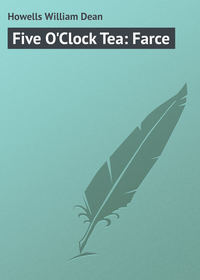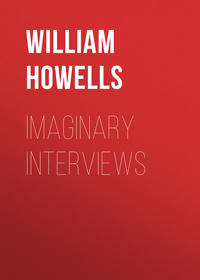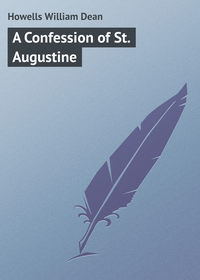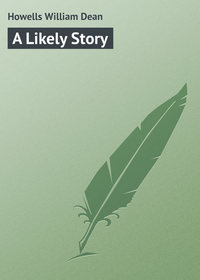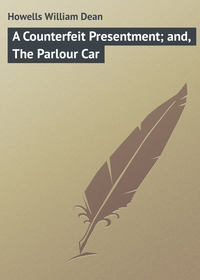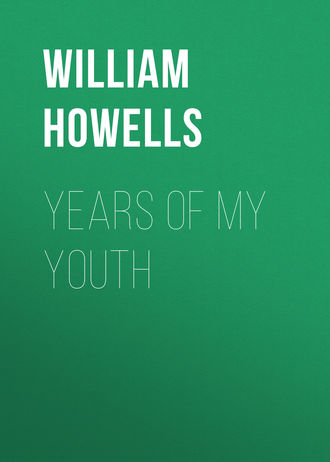 полная версия
полная версияYears of My Youth
VI
What account I gave of the experience in print I cannot say after the lapse of fifty-seven years, but no doubt I tried to make merry over it, with endeavor for the picturesque and dramatic. Through the whole of a life which I do not complain of for lasting so long, though I do not like being old, I have found that in my experiences, where everything was novel, some of the worst things were the things I would not have missed. It had not been strictly in the line of my duty as news editor to make that excursion, but I dare say I did it gladly, for the reasons suggested. There were other reasons which were to make themselves apparent during the year: on my salary of ten dollars a week I could not afford to be very punctilious; and if I was suffered to stray into the leading columns of the editorial page I could not stand upon the dignity of the news editor if I was now and then invited to do a reporter’s work. Besides, there were tremors of insecurity in my position, such as came from the bookkeeper’s difficulty in sometimes finding the money for my weekly wage, which might well have alarmed me for the continued working of the economic machine. Like every man who depends upon the will or power of another man to give him work, I served a master, and though I served the kindest master in the world, I could not help sharing his risks. It appeared that our newspaper had not been re-established upon a foundation so firm but that it needed new capital to prop it, after something over a year, and then a business change took place which left me out. I was not altogether sorry, for about the same time my senior resigned and went to Cincinnati to cast in his fortunes as joint owner and editor with another paper. Without him, though I should have fearlessly undertaken the entire conduct of our journal, I should not have felt so much at home in it, for I did not know then, as I have learned and said long since, that a strong writer, when he leaves a newspaper, leaves a subtle force behind him which keeps him indefinitely present in it. But there was no question of my staying, and though my chief’s wish to have me stay almost made it seem as if I were staying, I had to go, and I had to leave him my debtor in two hundred dollars. I hasten to say that the debt was fully paid in no very long time, but it seems to me that the world was managed much less on a cash basis in those days than in these; people did not expect to be paid their money as soon as they had earned it; the economic machine creaked and wabbled oftener, and had to be sprinkled with cool patience when the joints worked dry of oil. This may be my fancy, partly built from the fact that my father in his life of hard work was nearly lifelong in debt, while others lived and died as many dollars in debt to him.
It must have been before this humiliating event, which I cannot exactly date, that I was asked to deliver the poem before the Ohio Editorial Convention which used annually to grace its meeting with some expression in verse. There must have been an opening prayer and an address, but I remember neither of these, and I should not be able to remember my poem, or any part of it, if it had not afterward been printed in our newspaper, from which the kindness of a friend has rescued it for me. I have just read it over, not wholly with contempt, but not without compassion for those other editors who listened to it and could have followed its proud vaticinations but darkly. It appears that I then trusted the promises of a journalistic future which have not all been kept as yet, and that I cast my prophecies in a form and mood which I might have accused Tennyson of imitating if he had not been first with his “In Memoriam.”
The Men that make the vanished pastSo brave, the present time so base,And people, with their glorious race,The golden future, far and vast! —All ages have been dark to these,The true Knights Errant! who have doneTheir high achievements not aloneIn the remoter centuries;But ever to their dawn’s dim eye,Blinded with night-long sorcery,Warring with Shadows seemed to be, —In victory, seemed to fall and die!Noons glowed. The poet held each nameIn hushless music to the ear —Low for the thinking few to hear,Loud for the noisy world’s acclaim;And pondering, one that turns the pageWhereon their story hath been writ,Gathers a purer lore from it,Than all the wisdom of the sage; —A simple lore of trust and faithFor Life’s fierce days of dust and heat, —To keep the heart of boyhood sweetThrough every passion, unto death —To love and reverence his time,Not for its surface-growth of weeds,But for its goodly buried seeds, —To hope, and weave a hopeful rhyme!The vision does not seem very clear even to me, now, and I suppose not many of those kind, hard-working country printers and busy city journalists recognized themselves in my forecast of the coming newspaper man. Yet I think there is something in the glowing fancy which is here reflected only in part, and I believe some graduate of our university courses of journalism may possibly do worse than keep my fond dream in mind. In this case, the yawning counting-room may not so soon engulf his high intentions, and, keeping clear of that shining sepulcher of noble ideals for a while, he may thank me for my over-generous faith in him.
No one that I can recall specifically thanked me at the time of that editorial convention, though no doubt the usual resolutions thanking the orator and poet were passed. I should be glad to believe that at the ball which crowned our festival some kind woman-soul may have tried to feign a pleasure in my verse which no man-soul attempted; but I have only the memory of my fearful joy in the dance which I seem to have led. I went back to Columbus with such heart as I could, but in the dense foreshortening of the time’s events I cannot find that of my own unhorsing from the shining procession of journalists figured in my poem. I can only be sure that I was unhorsed, and then suddenly, to my great joy and even greater surprise, was caught up and given a new mount, with even larger pay. That is, I was now invited to become professional reader for the young publisher who had issued the Poems of Two Friends, and who, apparently inspired by the signal failure of that book, imagined establishing a general publishing business in our capital. He followed it with several very creditable books, and he seems to have had the offer of many more manuscripts than he could handle. I have no doubt I dealt faithfully with these, and I know that he confided entirely in my judgment, for I was now twenty-three, without a doubt of my own as to my competence. There was one manuscript, offered by a lady who had lived some years in Chile, which I thought so interesting, though so formless, that I wrote it quite over, and my friend published it in a book which I should like to read again; but I have no hope of ever seeing it. He also published a very good Ohio version of Gautier’s Romance of a Mummy, but our bravest venture was a book which the publisher himself had fancied doing, and which he had fancied my writing. This was the life of Abraham Lincoln, printed with his speeches in the same volume with the life and speeches of Hannibal Hamlin, who was nominated with him on the Presidential ticket at the Republican Convention in 1860. It was the expectation of my friend, the very just and reasonable expectation, that I should go to Springfield, Illinois, and gather the material for the work from Lincoln himself, and from his friends and neighbors. But this part of the project was distasteful to me, was impossible; I felt that there was nothing of the interviewer in me, at a time when the interviewer was not yet known by name even to himself. Not the most prophetic soul of the time, not the wisest observer of events, could have divined my loss; and I was no seer. I would not go, and I missed the greatest chance of my life in its kind, though I am not sure I was wholly wrong, for I might not have been equal to that chance; I might not have seemed to the man whom I would not go to see, the person to report him to the world in a campaign life. What we did was to commission a young law student of those I knew, to go to Springfield and get the material for me. When he brought it back, a sheaf of very admirable notes, but by no means great in quantity, I felt the charm of the material; the wild poetry of its reality was not unknown to me; I was at home with it, for I had known the belated backwoods of a certain region in Ohio; I had almost lived the pioneer life; and I wrote the little book with none of the reluctance I felt from studying its sources. I will not pretend that I had any prescience of the greatness, the tragical immortality, that underlay the few simple, mostly humble, facts brought to my hand. Those who see that unique historic figure in the retrospect will easily blame my youthful blindness, but those who only knew his life before he overtopped all the history of his time will not be so ready to censure me for my want of forecast. As it was, I felt the inadequacy of my work, and I regretted it in the preface which owned its hasty performance.
There were several campaign lives of Lincoln which must have seemed better than mine to him; I cannot care now how it seemed to others; but what he thought of it I never knew. Within a few years I have heard that he annotated a copy of it, and that this copy is still somewhere extant in the West; but I am not certain that I should like to see it, much as my curiosity is concerning it. He might, he must, have said some things which could not console me for missing that great chance of my life when I was too young to know it. I saw him twice in Columbus, as I have told here already, and once in Washington, as I have told elsewhere. That was when I came from the office of his private secretaries at the White House, secure of my appointment as Consul at Venice, and lingered wistfully as he crossed my way through the corridor. Within no very long time past my old friend Piatt (he of the Poems of Two Friends) has told me that Lincoln then meant me to speak to him, as I might very fitly have done, in thanking him for my appointment, and that he had followed me out from the secretaries’ room to let me do so. He might have had some faint promptings of curiosity concerning the queer youth who had written that life of him from material which he would not come to him for in person. But without doubting my friend, I doubt the fact; neither Hay nor Nicolay ever mentioned the matter to me in our many talks of Lincoln; and I cannot flatter myself that I missed another greatest chance of my life. Rather, I imagine that he did not know who I was, or could in the least care, under the burdens which then weighed upon him. He might have suspected me an office-seeker without the courage to approach him instead of the office-seeker whose hopes he had, very likely without vividly realizing it, crowned with joy. I blame myself for not speaking to him, of course, as I blame myself for not having gone to him instead of sending to him for the facts of his past; in any event, with my literary sense, I must have valued those facts; but if Lincoln had not been elected in 1860 he would not have been nominated again; and in that case should I now be reproaching myself so bitterly?
VII
Another fame so akin to Lincoln’s in tragedy, and most worthy of mention in the story of his great time, is that of a state senator of ours in the legislative session of 1860. James A. Garfield, of whose coming to read Tennyson to us one morning in the Journal office I have told in My Literary Passions, was then a very handsome young man of thirty, with a full-bearded handsome face, and a rich voice suited to reading “The Poet” in a way to win even reluctant editors from their work to listen. It is strange that I should have no recollection of meeting Garfield again in Columbus, or anywhere, indeed, until nearly ten years later, when I stopped with my father over a night at his house in Hiram, Ohio, where we found him at home from Congress for the summer. I was then living in Cambridge, in the fullness of my content with my literary circumstance, and as we were sitting with the Garfield family on the veranda that overlooked their lawn I was beginning to speak of the famous poets I knew when Garfield stopped me with “Just a minute!” He ran down into the grassy space, first to one fence and then to the other at the sides, and waved a wild arm of invitation to the neighbors who were also sitting on their back porches. “Come over here!” he shouted. “He’s telling about Holmes, and Longfellow, and Lowell, and Whittier!” and at his bidding dim forms began to mount the fences and follow him up to his veranda. “Now go on!” he called to me, when we were all seated, and I went on, while the whippoorwills whirred and whistled round, and the hours drew toward midnight. The neighbors must have been professors in the Eclectic Institute of Hiram where Garfield himself had once taught the ancient languages and literature; and I do not see how a sweeter homage could have been paid to the great renowns I was chanting so eagerly, and I still think it a pity my poets could not have somehow eavesdropped that beautiful devotion. Under the spell of those inarticulate voices the talk sank away from letters and the men of them and began to be the expression of intimate and mystical experience; and I remember Garfield’s telling how in the cool of a summer evening, such as this night had deepened from, he came with his command into a valley of the Kanawha; for he had quickly turned from laws to arms, and this was in the beginning of the great war. He said that he noticed a number of men lying on the dewy meadow in different shapes of sleep, and for an instant, in the inveterate association of peace, he thought they were resting there after the fatigue of a long day’s march. Suddenly it broke upon him that they were dead, and that they had been killed in the skirmish which had left the Unionist force victors. Then, he said, at the sight of these dead men whom other men had killed, something went out of him, the habit of his lifetime, that never came back again: the sense of the sacredness of life, and the impossibility of destroying it. He let a silence follow on his solemn words, and in the leading of his confession he went on to say how the sense of the sacredness of other things of peace had gone out of some of the soldiers and never come back again. What was not their own could be made their own by the act of taking it; and he said we would all be surprised to know how often the property of others had been treated after the war as if it were the property of public enemies by the simple-hearted fellows who had carried the use of war in the enemy’s country back into their own. “You would be surprised,” he ended, “to know how many of those old soldiers, who fought bravely and lived according to the traditions of military necessity, are now in the penitentiary for horse-stealing.”
Once again I memorably met Garfield in my father’s house in Ashtabula County (the strong heart of his most Republican Congressional district) where he had come to see me about some passages in Lamon’s Life of Lincoln, which was then in the hands of my Boston publishers, withheld in their doubt of the wisdom or propriety of including them. I think Garfield was then somewhat tempted by the dramatic effect these passages would have with the public, but he was not strenuous about it, and he yielded whatever authority he might have had in the matter to the misgiving of the publishers; in fact, I do not believe that if it had been left to him altogether he would have advised their appearance. I met him for the last time in 1879 (when my wife and I were for a week the guests of President Hayes), as he was coming, with Mrs. Garfield on his arm, from calling upon us at the White House. He stopped me and said, “I was thinking how much like your father you carried yourself,” and I knew that he spoke from the affection which had been many years between them. I was yet too young to feel the resemblance, but how often in my later years I have felt and seen it! As we draw nearer to the door between this world and the next it is as if those who went before us returned to us out of it to claim us part of them.
VIII
I never had any report of the book’s sales, but I believe my Life of Lincoln sold very well in the West, though in the East it was forestalled by the books of writers better known. In the quiet which followed with a business which is always tending to quiescence (if the mood of the trade when discouraging authors may be trusted) my young publisher suggested my taking one hundred and seventy-five dollars of my money, and going to Canada and New England and New York on a sort of roving commission for another work he had imagined. It was to be a subscription book reporting the state and describing the operation of the principal manufacturing industries, and he thought it an enterprise peculiarly suited to my powers. I did not think so, but I was eager to see the world, especially the world of Boston, and I gladly took my hundred and seventy-five dollars and started, intending to do my best for the enterprise, though inwardly abhorring it. The best I could do was to try seeing the inner working of an iron foundry in Portland, where I was suspected of designs upon the proprietorial processes and refused admission; and I made no attempt to surprise the secrets of other manufacturers. But I saw Niagara Falls, which did not withhold its glories from me in fear of the publicity which I gave them in my letters to the Cincinnati Gazette; and I saw the St. Lawrence River and Montreal and Quebec, with the habitant villages round about them. I also saw the ocean at Portland (not so jealous of its mysteries as the iron foundry); I saw Boston and Cambridge, and Lowell and Holmes, and their publisher, Fields; I saw New York and Walt Whitman, and the Hudson River. This has been fully told in my Literary Friends and Acquaintance, and need not be told again here; but what may be fittingly set down is that when I arrived home in Columbus I found the publishing business still quieter than I had left it, and my friend with no enterprise in hand which I could help him bring to a successful or even unsuccessful issue. In fact he had nothing for me to do in that hour of mounting political excitement, and this did not surprise me. Neither did it surprise me that my old chief of the State Journal should ask me to rejoin him, though it did greatly rejoice me. He was yet in that kind illusion of his that he was working too hard on the paper; he expressed his fear that in the demand made upon his time by public affairs he should not be able to give it the attention he would like, and he proposed that I should return to a wider field in it, on an increased wage; he also intimated that he should now be able to bring up my arrears of salary, and he quite presently did so.
Again I was at the work which I was always so happy in, and I found myself associated in it on equal terms with a man much nearer my own age than my former associate Reed was. My new fellow-journalist had come to our chief from his own region in northwestern Ohio; I do not know but from his old newspaper there. I cannot write the name of Samuel Price without emotion, so much did I rejoice in our relation to the paper and each other, with its daily incident and bizarre excitement throughout the year we were together. I like to bring his looks before me; his long face with its deep, vertical lines beside the mouth, his black hair and eyes and smoky complexion; his air very grave mostly, but with an eager readiness to break into laughter. It seems to me now that our functions were not very sharply distinguished, though I must have had charge as before of the literary side of the work. We both wrote leading editorials, which our chief supervised and censored for a while and then let go as we wrote them, perhaps finding no great mischief in them. Reed remained the tradition of the office, and if I had formed myself somewhat on his mood and manner, Price now formed himself on mine; and somehow we carried the paper through the year without dishonor or disaster.
It was that year so memorable to me for having five poems published in the Atlantic Monthly, two of them in the same number, and I must have been strongly confirmed in my purpose of being a poet. Of course I knew too much of the world, and the literary world, to imagine that I could at once make a living by poetry, but I probably expected to live by some other work until my volumes of poetry should accumulate in sufficient number and sell in sufficient quantity to support me without the aid of prose. As yet I had no expectation of writing fiction; I had not recovered from the all-but-mortal blow dealt my hopes in the failure of that story which I had begun printing in my father’s newspaper before I had imagined an ending for it, though I must for several years have been working in stolen moments at another story of village life, which I vainly offered to the Atlantic Monthly and the Knickerbocker Magazine, and after that for many years tried to get some publisher to bring out as a book. The manuscript must still somewhere exist, and I should not be surprised, if I ever found it, to find myself respecting it for a certain helpless reality in its dealing with the conditions I knew best when I began writing it. But it was still to be nearly ten years before I tried anything else of the sort, and even in Their Wedding Journey, which was my next attempt, I helped myself out with travel-adventure in carrying forward a slender thread of narrative. Every now and then, however, I wrote some sketch or study, which I printed in our newspaper, where also I printed pieces of verse, too careless or too slight to be hopefully offered for publication in the East.
IX
I was not only again at congenial work, but I was in the place that I loved best in the world, though as well as I can now visualize the town which had so great charm for me then I can find little beauty in it. High Street was the only street of commerce except for a few shops that had strayed down from it into Town Street, and the buildings which housed the commerce were not impressive, and certainly not beautiful. A few hotels, three or four, broke the line of stores; there was the famous restaurant of Ambos, and some Jewish clothiers; but above all, besides a music and picture store, there was an excellent bookstore, where I supplied myself from a good stock of German books, with Heine and Schiller and Uhland, and where one could find all the new publications. The streets of dwellings stretched from High Street to the right, over a practically interminable plain, and shorter streets on the left dropped to the banks of the Scioto where a lower level emulated the inoffensive unpicturesqueness of the other plain. A dusty bridge crossed the river, where in the slack-water ordinarily drowsed a flock of canal-boats which came and went on the Ohio Canal. Some old-fashioned, dignified dwellings stood at the northern end of High Street, with the country close beyond, but the houses which I chiefly knew were on those other streets. I cannot say now whether they added to the beauty of the avenues or not; I suppose that oftenest they did not embellish them architecturally, though they were set in wide grounds among pleasant lawns and gardens. The young caller knew best their parlors in winter and their porches in summer; there was little or no lunching or dining for any one except as a guest of pot-luck; and the provisioning was mainly, if not wholly, from the great public market. Greengrocers’ and butchers’ shops there were none, but that public market was of a sumptuous variety and abundance, as I can testify from a visit paid it with a householding friend who drove to it in his carriage, terribly long before breakfast, and provisioned himself among the other fathers and the mothers who thronged the place with their market-baskets. This was years after my last years in Columbus, when I was a passing guest; while I lived there I was citizen of a world that knew no such household cares or joys.
On my return from my travels, though I was so glad to be again in Columbus, I no longer gave myself up to society with such abandon as before. I kept mostly to those two houses where I was most intimate, and in my greater devotion to literature I omitted to make the calls which were necessary to keep one in society even in a place so unexacting as our capital. Somewhat to my surprise, somewhat more to my pain, I found that society knew how to make reprisals for such neglect; I heard of parties which I was not asked to, and though I might not have gone to them, I suffered from not being asked. Only in one case did I regret my loss very keenly, and that was at a house where Lincoln’s young private secretaries, Hay and Nicolay, passing through to Washington before the inauguration, had asked for me. They knew of me as the author of “The Pilot’s Story” and my other poems in the Atlantic Monthly, as well as that campaign life of Lincoln which I should not have prided myself on so much; but I had been justly ignored by the hostess in her invitations, and they asked in vain. I fully shared after the fact any disappointment they may have felt, but I doubt if I was afterward more constant in my social duties; I was intending more and more to devote myself to poetry, and with a hand freer than ever, if that were possible, in the newspaper, I was again feeling the charm of journalism, and was giving to it the nights which I used to give to calls and parties.




